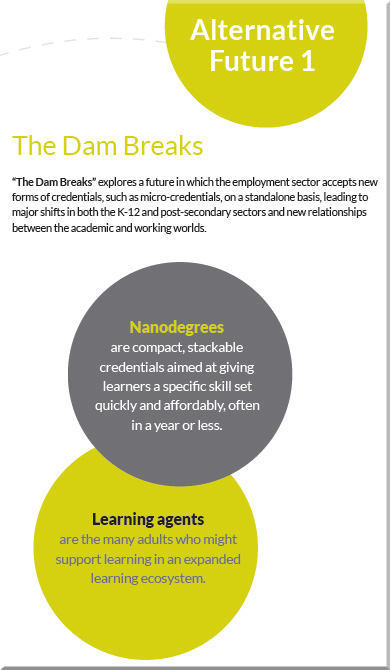Certifying skills and knowledge: Four scenarios on the future of credentials — from knowledgeworks.org by Jason Swanson
Excerpts:
Disruptions to the education system and employment sector are changing what it means to acquire knowledge and skills. Fundamental changes in how we educate learners promise to change how we credential learning. In turn, changes to the way we work could alter the value placed on credentials and how individuals earn them.
This paper considers trends in the education and employment sectors to explore four possible scenarios reflecting how credentials might reflect individuals’ knowledge and skills in ten years’ time.
…
Exploring the Future of Credentials
In order to explore what credentials might look like in ten years, this paper considers four scenarios for the future of credentials:
A baseline future, “All Roads Lead to Rome,” imagines a future in which degrees awarded by the K-12 and post-secondary sectors still serve as the dominant form of credentials, but there are many roads toward gaining those credentials, such as diverse
forms of school and educational assessments.
An alternative future, “The Dam Breaks,” explores a future in which the employment sector accepts new forms of credentials, such as micro-credentials, on a standalone basis, leading to major shifts in both the K-12 and post-secondary sectors and new relationships between the academic and working worlds.
A second alternative future, “Every Experience a Credential,” considers what credentials might look like if new technologies enabled every experience to be tracked and catalogued as a form of credential for both students and employees.
A wild card scenario, “My Mind Mapped,” imagines a future in which breakthroughs in both the mapping and tracking of brain functions have created a new type of credential reflecting students’ cognitive abilities and social and emotional skills.
…
Each scenario in this paper reflects different drivers of change and a different set of fundamental assumptions about how changes affecting credentials might play out across the K-12, post-secondary, and employment sectors.
From DSC:
I appreciate Jason’s futurist approach here and his use of scenarios. Such an approach helps stimulate our thinking about the potential “What if’s” that could occur — and if they did occur, what would our game plan be for addressing each one of these scenarios?
————-
A related addendum on 4/24/15:
- Survey shows growth of open badges — from totaralms.com by Richard Wyles [March 7, 2015]

Excerpt:
If you were an academic institution, you might feel a little bit threatened. Over 60% of organisations now believe that the crown jewel of traditional educators – certifications and diplomas – is about to be dethroned by a new uprising: Digital Badges. That’s the finding of research by Extreme Networks on the current adoption of Digital Badges and prospects for the future.









